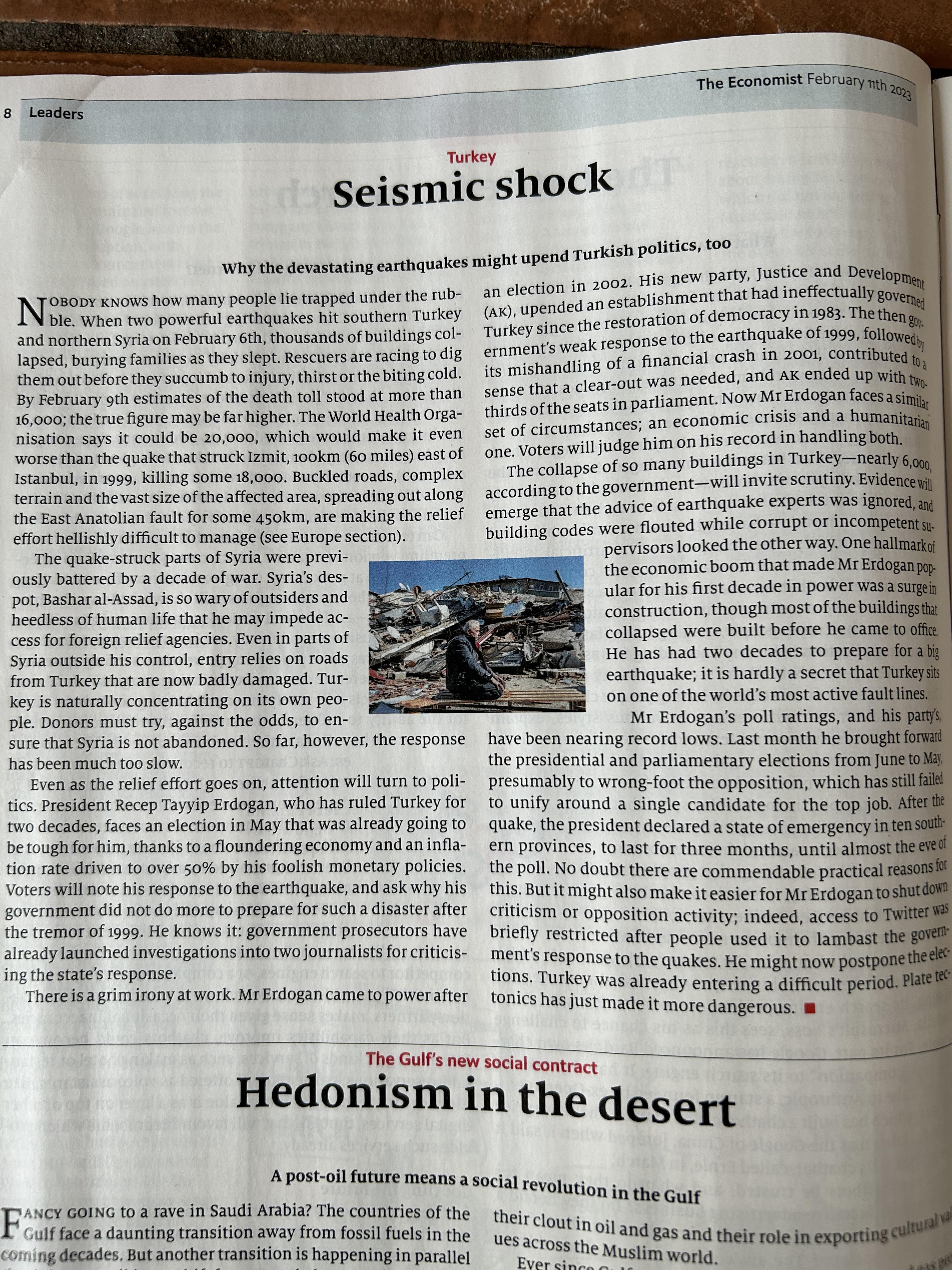Answered step by step
Verified Expert Solution
Question
1 Approved Answer
What key concepts in Colander and Freedman's Where Economics Went Wrong can be seen in Seismic Shock? 8 Leaders Turkey Seismic shock di OBODY KNOWS
What key concepts in Colander and Freedman's Where Economics Went Wrong can be seen in "Seismic Shock"?

8 Leaders Turkey Seismic shock di OBODY KNOWS how many people lie trapped under the rub- Turkey The Economist February 11th 2023 Why the devastating earthquakes might upend Turkish politics, too gov. an election in 2002. His new party, Justice and Development (AK), upended an establishment that had ineffectually governed Turkey since the restoration of democracy in 1983. The then g ernment's weak response to the earthquake of 1999, followed by its mishandling of a financial crash in 2001, contributed to a sense that a clear-out was needed, and AK ended up with two- thirds of the seats in parliament. Now Mr Erdogan faces a similar set of circumstances; an economic crisis and a humanitarian one. Voters will judge him on his record in handling both. The collapse of so many buildings in Turkey-nearly 6,000, according to the government will invite scrutiny. Evidence will emerge that the advice of earthquake experts was ignored, and building codes were flouted while corrupt or incompetent su- pervisors looked the other way. One hallmark of the economic boom that made Mr Erdogan pop- ular for his first decade in power was a surge in construction, though most of the buildings that collapsed were built before he came to office. He has had two decades to prepare for a big earthquake; it is hardly a secret that Turkey sits on one of the world's most active fault lines. Mr Erdogan's poll ratings, and his party's, have been nearing record lows. Last month he brought forward the presidential and parliamentary elections from June to May, presumably to wrong-foot the opposition, which has still failed to unify around a single candidate for the top job. After the quake, the president declared a state of emergency in ten south- ern provinces, to last for three months, until almost the eve of the poll. No doubt there are commendable practical reasons for this. But it might also make it easier for Mr Erdogan to shut down criticism or opposition activity; indeed, access to Twitter was briefly restricted after people used it to lambast the govern- ment's response to the quakes. He might now postpone the elec- tions. Turkey was already entering a difficult period. Plate tec tonics has just made it more dangerous. and northern Syria on February 6th, thousands of buildings col- lapsed, burying families as they slept. Rescuers are racing to dig them out before they succumb to injury, thirst or the biting cold. By February 9th estimates of the death toll stood at more than 16,000; the true figure may be far higher. The World Health Orga- nisation says it could be 20,000, which would make it even worse than the quake that struck Izmit, 100km (60 miles) east of Istanbul, in 1999, killing some 18,000. Buckled roads, complex terrain and the vast size of the affected area, spreading out along the East Anatolian fault for some 450km, are making the relief effort hellishly difficult to manage (see Europe section). The quake-struck parts of Syria were previ- ously battered by a decade of war. Syria's des- pot, Bashar al-Assad, is so wary of outsiders and heedless of human life that he may impede ac- cess for foreign relief agencies. Even in parts of Syria outside his control, entry relies on roads from Turkey that are now badly damaged. Tur- key is naturally concentrating on its own peo- ple. Donors must try, against the odds, to en- sure that Syria is not abandoned. So far, however, the response has been much too slow. Even as the relief effort goes on, attention will turn to poli- tics. President Recep Tayyip Erdogan, who has ruled Turkey for two decades, faces an election in May that was already going to be tough for him, thanks to a floundering economy and an infla- tion rate driven to over 50% by his foolish monetary policies. Voters will note his response to the earthquake, and ask why his government did not do more to prepare for such a disaster after the tremor of 1999. He knows it: government prosecutors have already launched investigations into two journalists for criticis- ing the state's response. There is a grim irony at work. Mr Erdogan came to power after The Gulf's new social contract Hedonism in the desert A post-oil future means a social revolution in the Gulf FA ANCY GOING to a rave in Saudi Arabia? The countries of the their clout in oil and gas and their role in exporting cultural va Gulf face a daunting transition away from fossil fuels in the coming decades. But another transition is happening in parallel ues across the Muslim world. Ever since C
Step by Step Solution
There are 3 Steps involved in it
Step: 1
Seismic Shock is an article written by Robert J Shiller and George A Akerlof which discusses how the financial crisis of 2008 was a result of widespre...
Get Instant Access to Expert-Tailored Solutions
See step-by-step solutions with expert insights and AI powered tools for academic success
Step: 2

Step: 3

Ace Your Homework with AI
Get the answers you need in no time with our AI-driven, step-by-step assistance
Get Started


